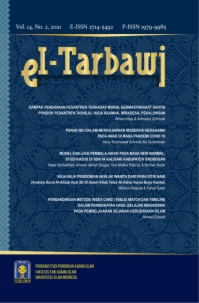Main Article Content
Abstract
The ever increase of moral degradation cases has proven the inability of
Indonesian modern educational institutions to create students with good
character. On the contrary, Islamic boarding school educational institutions
are one of the institutions that are expected to be able to change the morals of
the community, especially students to socialize through programs,
regulations, and habits of students in Islamic boarding schools. This study
aims to see the impact of the Taslihul Huda Islamic Boarding School
education on the morals of the santri community through existing activities,
programs, and regulations. The researcher used interviews and observations
to find data from the head and boarding school administrators, the
community, and the students who were there, then the researchers analysed
and processed the data by triangulation. From the results of the study, it can
be said that the existing programs and regulations at the Taslihul Huda
Islamic boarding school are effective in shaping the morals of the santri and
the community's ability to provide positive responses to students in
engaging with the community.
Keywords: Islamic Boarding School; Morality; Society; Students
Keywords
Article Details
Copyright (c) 2022 Wirani Atqia, Aminatuz Zuhriyah

This work is licensed under a Creative Commons Attribution-ShareAlike 4.0 International License.
Authors retain copyright and grant the journal right of first publication with the work simultaneously licensed under a Creative Commons Attribution (CC-BY-SA) 4.0 License that allows others to share the work with an acknowledgment of the work’s authorship and initial publication in this journal.
References
- Aminuddin. (2014). Pendidikan Agama Islam: Untuk Perguruan
- Tinggi Umum. Ghalia Indonesia.
- Arifin, B. S., & Jalil, M. A. (2015). Psikologi Agama (Bandung).
- Pustaka Setia. //senayan.iainpalangkaraya.
- ac.id/index.php?p=show_detail&id=11960& keywords=
- Databoks. (2019). Berapa Jumlah Sekolah di Indonesia?
- https://databoks.katadata.co.id/datapublish/2019/06/23/ber
- apa-jumlah-sekolah-di-indonesia
- Choiron, A. (2017). Budaya Organisasi Pesantren Dalam
- Membentuk Santri Putri Yang Peduli Konservasi
- Lingkungan. PALASTREN Jurnal Studi Gender, 10(1), 171–
- https://doi.org/10.21043/palastren.v10i1.2338
- Husodo, H. S. (2019). Degradasi Moral Akibatkan Kasus Pornografi
- Merebak. https://www.pikiran-rakyat.com/bandungraya/
- pr-01317700/degradasi-moral-akibatkan-kasuspornografi-
- merebak
- Mashlihuddin, Y. (2020). Degradasi Moral Remaja Indonesia.
- Http://P2kk.Umm.Ac.Id/. http://p2kk.umm.ac.id/
- Mas’ud, A., S.M., I., Huda, N., & Kholiq, A. (2002). Dinamika
- Pesantren dan Madrasah. Kerjasama Fakultas Tarbiyah,
- IAIN Walisongo dengan Pustaka Pelajar, Yogyakarta.
- Ningrum, V. Z., & Rochana, T. (2019). Perilaku Sosial Santri di
- Pondok Pesantren Tarbiyatul Muballighin Desa Reksosari
- Kecamatan Suruh Kabupaten Semarang. Solidarity: Journal
- of Education, Society and Culture, 8(2), 749–761.
- Nizarani, N., Kristiawan, M., & Sari, A. P. (2020). Manajemen
- Pendidikan Karakter Berbasis Pondok Pesantren. JurnalPatoni, A. (2007). Peran Kiai Pesantren dalam Partai Politik
- (Yogyakarta). Pustaka Pelajar.
- //meranti.perpus.iainptk.ac.id/index.php?p=show_detail&
- id=42005&keywords=
- Soebahar, A. H. (2013). Modernisasi Pesantren. LkiS Printing
- Cemerlang.
- Solihin, O. (2015). Makna Komunikasi Non Verbal Dalam
- Tradisi Sarungan di Pondok Pesantren Tradisional di Kota
- Bandung. JIPSI - Jurnal Ilmu Politik Dan Komunikasi
- UNIKOM, 4. http://jipsi.fisip.unikom.ac.id/jurnal/maknakomunikasi-
- non-verbal.31
- Sumardi, K. (2012). Potret Pendidikan Karakter di Pondok
- Pesantren Salafiah. Jurnal Pendidikan Karakter, 3, Article 3.
- https://doi.org/10.21831/jpk.v0i3.1246
- Suparta, M., Suhada, S., & Syukur, T. A. (2018). Transformasi
- Pondok Pesantren dalam Menanggulangi Radikalisme
- Agama Pada Pondok Pesantren Daerah Penyangga Ibu
- Kota Jakarta. Hikmah: Journal of Islamic Studies, 14(1), 1–39.
- https://doi.org/10.47466/hikmah.v14i1.98
- Umar, B. (2015). Hadits Tarbawy Pendidikan dalam Perspektif
- Hadits. Amzah.
- Uswatusolihah, U. (2017). Pembelajaran Public Speaking di
- Pondok Pesantren untuk Moderasi Indonesia.
- KOMUNIKA: Jurnal Dakwah Dan Komunikasi, 11(2), 282–
- https://doi.org/10.24090/komunika.v11i2.1370
- Zubaidi, A. (2020). Peran Pondok Pesantren Partisipatoris
- “Preman Taubat” dalam Membentuk Masyarakat Beriman
- dan Berpendidikan di Nganjuk, Jawa Timur.In Never Dies Alternative Islamic Education: Internalisasi Nilai-Nilai
- Pendidikan Islam dalam Ruang Publik. Edu Publisher.
References
Aminuddin. (2014). Pendidikan Agama Islam: Untuk Perguruan
Tinggi Umum. Ghalia Indonesia.
Arifin, B. S., & Jalil, M. A. (2015). Psikologi Agama (Bandung).
Pustaka Setia. //senayan.iainpalangkaraya.
ac.id/index.php?p=show_detail&id=11960& keywords=
Databoks. (2019). Berapa Jumlah Sekolah di Indonesia?
https://databoks.katadata.co.id/datapublish/2019/06/23/ber
apa-jumlah-sekolah-di-indonesia
Choiron, A. (2017). Budaya Organisasi Pesantren Dalam
Membentuk Santri Putri Yang Peduli Konservasi
Lingkungan. PALASTREN Jurnal Studi Gender, 10(1), 171–
https://doi.org/10.21043/palastren.v10i1.2338
Husodo, H. S. (2019). Degradasi Moral Akibatkan Kasus Pornografi
Merebak. https://www.pikiran-rakyat.com/bandungraya/
pr-01317700/degradasi-moral-akibatkan-kasuspornografi-
merebak
Mashlihuddin, Y. (2020). Degradasi Moral Remaja Indonesia.
Http://P2kk.Umm.Ac.Id/. http://p2kk.umm.ac.id/
Mas’ud, A., S.M., I., Huda, N., & Kholiq, A. (2002). Dinamika
Pesantren dan Madrasah. Kerjasama Fakultas Tarbiyah,
IAIN Walisongo dengan Pustaka Pelajar, Yogyakarta.
Ningrum, V. Z., & Rochana, T. (2019). Perilaku Sosial Santri di
Pondok Pesantren Tarbiyatul Muballighin Desa Reksosari
Kecamatan Suruh Kabupaten Semarang. Solidarity: Journal
of Education, Society and Culture, 8(2), 749–761.
Nizarani, N., Kristiawan, M., & Sari, A. P. (2020). Manajemen
Pendidikan Karakter Berbasis Pondok Pesantren. JurnalPatoni, A. (2007). Peran Kiai Pesantren dalam Partai Politik
(Yogyakarta). Pustaka Pelajar.
//meranti.perpus.iainptk.ac.id/index.php?p=show_detail&
id=42005&keywords=
Soebahar, A. H. (2013). Modernisasi Pesantren. LkiS Printing
Cemerlang.
Solihin, O. (2015). Makna Komunikasi Non Verbal Dalam
Tradisi Sarungan di Pondok Pesantren Tradisional di Kota
Bandung. JIPSI - Jurnal Ilmu Politik Dan Komunikasi
UNIKOM, 4. http://jipsi.fisip.unikom.ac.id/jurnal/maknakomunikasi-
non-verbal.31
Sumardi, K. (2012). Potret Pendidikan Karakter di Pondok
Pesantren Salafiah. Jurnal Pendidikan Karakter, 3, Article 3.
https://doi.org/10.21831/jpk.v0i3.1246
Suparta, M., Suhada, S., & Syukur, T. A. (2018). Transformasi
Pondok Pesantren dalam Menanggulangi Radikalisme
Agama Pada Pondok Pesantren Daerah Penyangga Ibu
Kota Jakarta. Hikmah: Journal of Islamic Studies, 14(1), 1–39.
https://doi.org/10.47466/hikmah.v14i1.98
Umar, B. (2015). Hadits Tarbawy Pendidikan dalam Perspektif
Hadits. Amzah.
Uswatusolihah, U. (2017). Pembelajaran Public Speaking di
Pondok Pesantren untuk Moderasi Indonesia.
KOMUNIKA: Jurnal Dakwah Dan Komunikasi, 11(2), 282–
https://doi.org/10.24090/komunika.v11i2.1370
Zubaidi, A. (2020). Peran Pondok Pesantren Partisipatoris
“Preman Taubat” dalam Membentuk Masyarakat Beriman
dan Berpendidikan di Nganjuk, Jawa Timur.In Never Dies Alternative Islamic Education: Internalisasi Nilai-Nilai
Pendidikan Islam dalam Ruang Publik. Edu Publisher.
